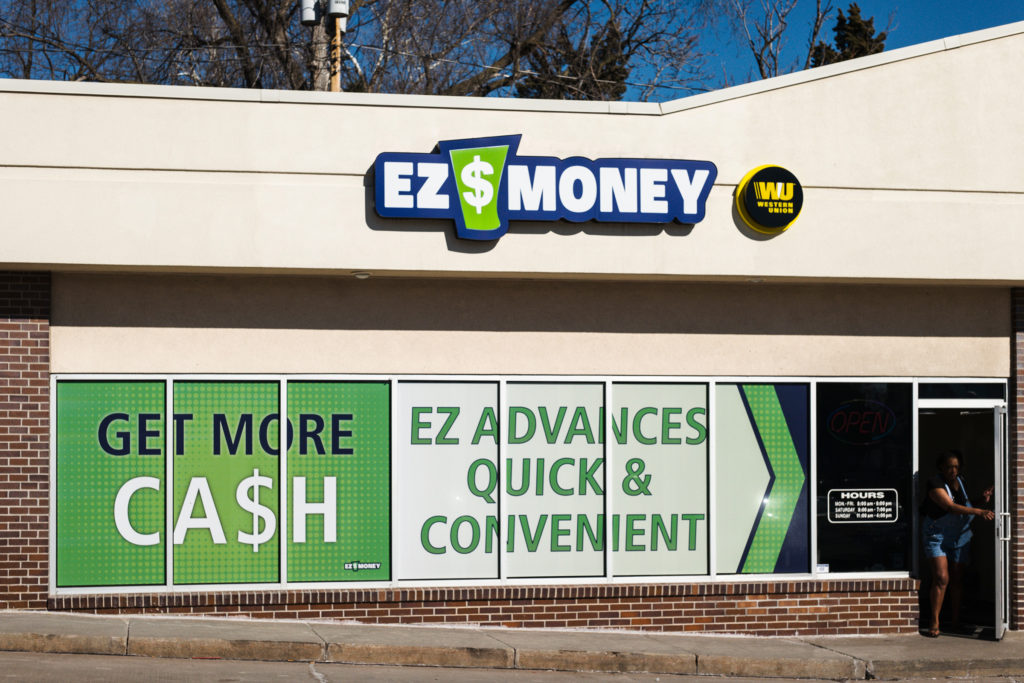Won’t Somebody Think of the Payday Lender Industry?

I’ve finally been convinced that a higher minimum wage is bad. After all, it would hurt that most respectable and morally upright sector of American capitalism: the payday lender industry!
It may seem axiomatic, but it’s rarely stated out loud: Businesses that rely on poor people need the economic system to keep churning out poor people to survive. You almost have to applaud the payday lending industry for finally making this explicit in Arizona.
A proposed constitutional amendment that looks likely to hit the ballot there next year would limit future increases to the minimum wage, may claw back scheduled increases already set to take effect, and eliminate a week of paid sick leave. One of the payday lending industry’s leading trade associations has bankrolled the measure, making plain the connection between a lack of income and the spread of predatory financial services. “It’s pretty incredible,” says Rodd McLeod, who works with Arizonans for Fair Lending, which is fighting the proposed ballot measure. “We need people to be poor in order to continue to make money.”
The ballot measure is actually a response to consumer advocates’ effort to eliminate high-dollar loans in Arizona. In 2008, the state soundly rejected payday lending; as an industry-backed ballot measure, Proposition 200, would have allowed those types of low-dollar, short-term, easy-to-roll-over loans, and it was defeated by a 60-40 popular vote. But payday lenders found an outlet nonetheless: About half of them switched their business model to auto title loans. These are similarly low-dollar loans that use as collateral a borrower’s car title. Typically, these loans run for two-to-four weeks, and the annual percentage rate (APR) can be as high as 204 percent in Arizona.
According to figures from Arizonans for Fair Lending, one in three state borrowers end up extending their auto title loan, creating a cycle of debt. One in five wind up having their vehicle repossessed. Title loan borrowers spend $254 million per year in interest, an analysis from the Center for Responsible Lending found.
After years of work, Arizonans for Fair Lending filed a ballot measure for the November 2020 election that would restrict car title loans in the state, reducing the permitted APR from 204 percent to 36 percent, making it equal to the maximum interest rate for other consumer loans in the state. “Usury is always wrong,” said Stephany Brown, president of the Society of St. Vincent de Paul in Tucson, in a statement after the announcement of the ballot measure.
The lenders then struck back, and then some. Their initiative, a proposed constitutional amendment known as the “Arizona Economic Freedom Act,” is intended to “prohibit the government from dictating price terms in transactions between private persons.” In the lending realm, that means that the state government could not set any limits on interest rates for financial services—not at 36 percent, not at 204 percent. If it passed, it would override the Arizonans for Fair Lending ballot measure, because it would be written into the constitution. Payday loans would still be banned, but auto title and other lenders would be permitted to run wild, with no limits on their interest rates.
However, the initiative goes well beyond that.
Tax and utility rate setting would remain untouched. But any regulation of ATM fees, or late fees on various transactions, would be eliminated. And since the employment contract is also a contract between private persons, the Economic Freedom Act would also rescind mandates put into law governing that process. That broad directive would eliminate minimum wages in the state entirely. However, language in the initiative would retain any minimum wage “if in effect as of December 31, 2019.”
That in itself could become controversial. Currently, thanks to the passage of Proposition 206 in 2016, Arizona’s minimum wage is scheduled to rise. Right now it stands at $11.00 an hour, and on January 1, 2020, it is supposed to go to $12.00, with an index for inflation thereafter. The Economic Freedom Act won’t be voted on until November 2020, but if it passes, the backers could potentially seek to claw the minimum wage back to $11.00 and freeze it there. The state Supreme Court experienced a shift to the right in 2016 when two extra justices were seated in a court-packing scheme. So the likelihood of a rollback in the minimum wage, if the initiative passes, is very possible.
In addition, Prop 206 included a week of paid sick leave for every Arizona employee. That too would be considered under the Economic Freedom Act as an unlawful imposition into a transaction between private persons, and would be eliminated.
Who is leading the Economic Freedom Act? The short-term lending industry. The front group has the anodyne name “Arizonans for Financial Freedom,” but as The Arizona Republic explains, the lead sponsor is a group called the National Credit Alliance, which is affiliated with the Financial Services Centers of America, a key trade group for payday lenders and check-cashing stores.
In other words, you have an industry that relies on a steady stream of poor people intervening in government policy to ensure a consistent stream of more poor people who require its services. “The answer to American families struggling paycheck to paycheck is a living wage, not predatory loans,” says Lauren Saunders, associate director at the National Consumer Law Center.
What is the definition of freedom if it is not using the government to ensure you can prey on the poor?


